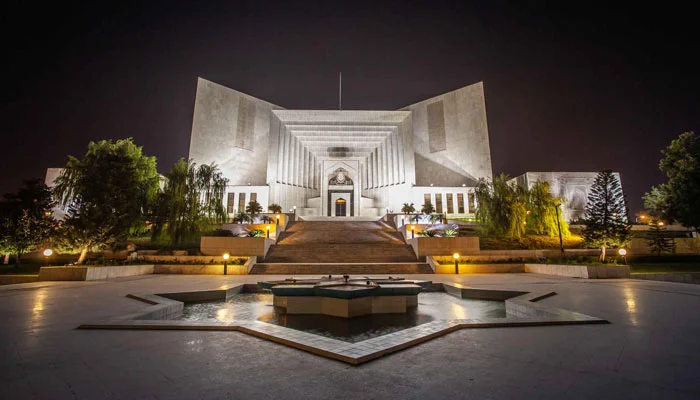Constitutional bench of Apex Court turns down plea to delay military trials appeals hearing with Rs 20,000 cost
Rejects plea of federal govt to allow announcement of verdicts by military courts
ISLAMABAD ( WEB NEWS )
The constitutional bench of the Supreme Court of Pakistan on Monday dismissed a petition seeking the postponement of hearings in the intra-court appeals related to the trial of civilians in military courts with the cost of Rs 20, 000.
A seven-member constitutional bench, led by Justice Amin-Ud-Din Khan, heard several petitions challenging the trial of civilians in military courts and seeking their annulment. Other members of the bench were Justice Jamal Khan Mandokhail, Justice Muhammad Ali Mazhar, Justice Syed Hasan Azhar Rizvi, Justice Musarrat Hilali, Justice Naeem Akhtar Afghan and Justice Shahid Bilal Hassan.
Former Chief Justice of Pakistan Jawwad S. Khawaja had filed a petition challenging the trial of civilians in military courts. Meanwhile, senior lawyer Aitzaz Ahsan had requested to suspend hearings until a decision on the 26th Constitutional Amendment petitions is reached.
The court dismissed the plea and imposed a fine of Rs 20,000 on former chief justice Jawwad S. Khawaja.
During Monday’s hearing, the Supreme Court questioned the counsel of Jawwad Khawaja regarding the jurisdiction of the constitutional bench. When asked if he recognised the bench, the counsel responded, “I do not accept the jurisdiction of the constitutional bench.” In response, Justice Mandokhail directed the counsel to leave the courtroom.
Jawwad Khwaja’s Counsel Khawaja Ahmad Hosain further argued that the current bench had been nominated by the Judicial Commission. This prompted Justice Mandokhail to inquire whether the 26th Constitutional Amendment had been invalidated.
Justice Mazhar, joining the conversation, criticised the counsel for what he perceived as delaying tactics, remarking, “At every hearing, there seems to be a new request.”
Justice Mazhar added that if the 26th Amendment were to be annulled, judicial decisions would remain protected, emphasizing that even those held under military courts would likely support this outcome.
The bench then called Hafeezullah Khan Niazi to the rostrum. Justice Mandokhail asked Niazi if he wished to proceed with the case, to which he affirmed his intent.
Meanwhile, Justice Musarrat Hilali told Khawaja Ahmad Hosain: “Think about those who are in jail. You have no right to a claim in this case.”
The court dismissed the petition to stop proceedings on the ICAs and imposed a Rs20,000 fine on former CJP Khawaja.
During the hearing, the defence ministry’s lawyer, Khawaja Haris Ahmad, argued that it was wrong to say that civilians could not be tried in military courts, adding that the Army Act was also applicable to employees of private companies working with the armed forces.
Justice Jamal Khan Mandokhail remarked that civilians who worked in ordinance factories were in a different category to which Haris responded that the Army Act mentioned that.
Meanwhile, Justice Mazhar said that Haris’ case did not fall under the relevant section of the Army Act while Justice Hilali questioned whether corps commanders declared their houses as office when using them as such.
“How true is it that this idea came later that the corps commander’s house was also an office?” she asked.
Justice Afghan asked how the anti-terrorism courts (ATCs) handed over the suspects to the military and questioned whether there was any order available on the ATCs’ reasons.
In addition, Pakistan Tehreek-e-Insaf (PTI) leader Salman Akram Raja, who is also a professional lawyer, argued that he also had certain objections to the judgement authored by Justice Munib Akhtar which, he said, he would argue.
Justice Rizvi asked how the trial of those involved in the Army Public School attack in 2014 had been conducted.
Defence Ministry counsel Khawaja Haris responded that the trial in the APS case was conducted according to the 21st Constitutional Amendment.
Meanwhile, the court dismissed Niazi’s plea to shift his accused son Hassaan Niazi to jail.
Later on in the proceedings, Additional Attorney General Chaudhry Amir Rehman argued that trials in the military courts were completed and permission should be given for verdicts to be announced to which Justice Hilali that this could not be permitted otherwise the issue of civilian trials in the military courts itself would be resolved.
Justice Mandokhail remarked that the crime of obstructing military personnel from their duty was present in the country’s laws and under them, those who did so would be tried in ordinary courts.
The judges subsequently rejected the AAG’s request and the hearing was adjourned till tomorrow (Tuesday).
Justice Mandokhail concluded by clarifying that the Supreme Court was operating in line with the constitutional amendment, reinforcing that the court’s actions were within the scope of the law.
On the other hand, Chief Justice of Pakistan Yahya Afridi has referred the matter of forming a full court to hear multiple petitions against the 26th Constitutional Amendment to the constitutional benches committee.

